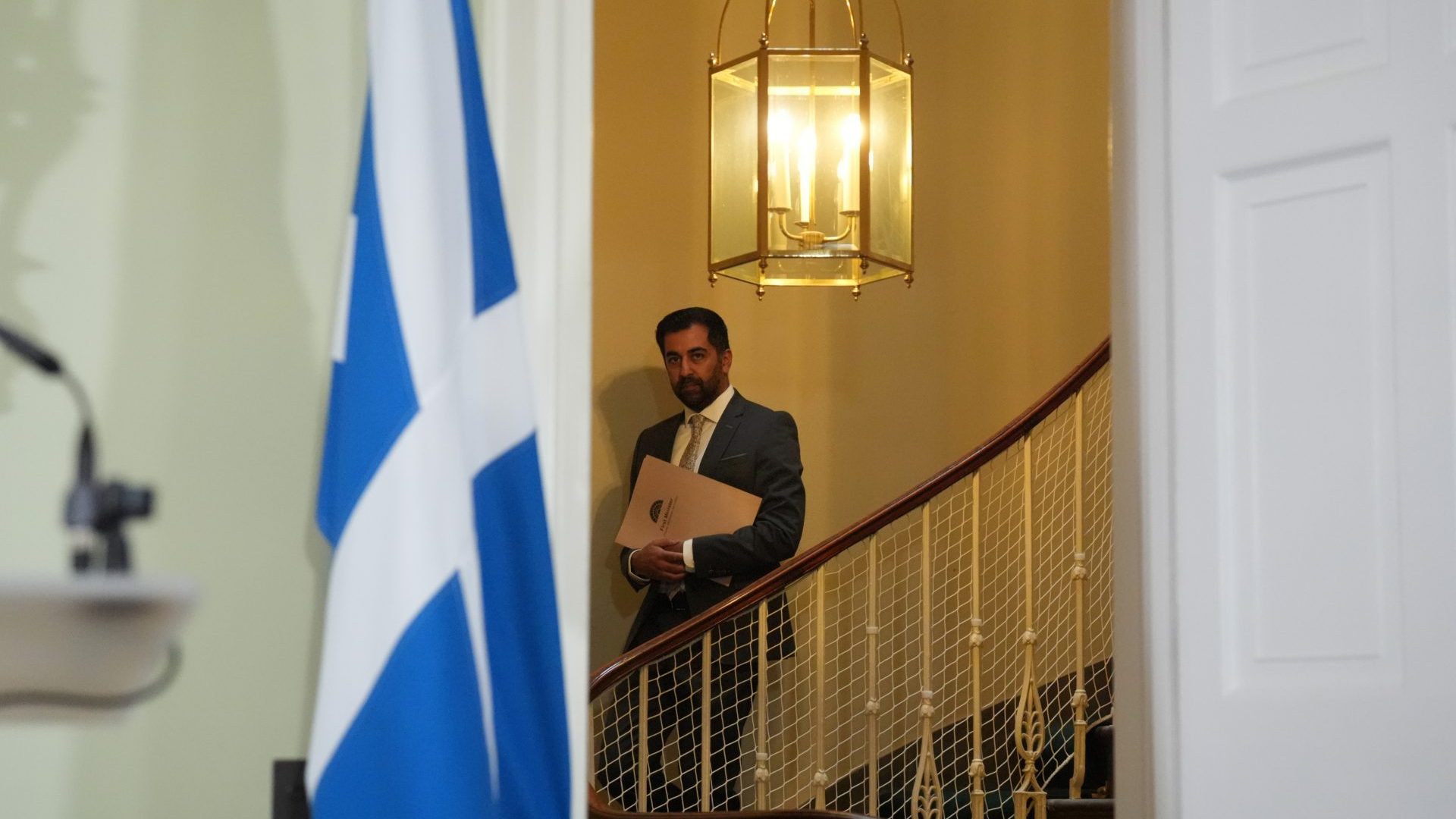In the manner of a prophecy from the Delphic Oracle – whose predictions supposedly came true, though often not in the manner those who heard them expected – Monday marked the end of the career of one UK political leader.
It was not that of Rishi Sunak, who so far at least has defied predictions he would call a general election, but instead of another embattled politician – Scotland’s first minister Humza Yousaf, who has resigned after just over one year in post.
It is both safe and fair to say that at least in the short run, Yousaf’s fate was avoidable and his downfall was largely of his own making. The proximate cause of the Scottish’s FM’s collapse went something like this: the SNP realised they needed to drop their 2030 climate targets as they were essentially impossible to achieve.
This would always be awkward given that the SNP is governing thanks to an alliance – governed by the Bute House agreement – with the Scottish Green Party. The smaller party in any coalition tends to have to suck up decisions it doesn’t like, but asking Greens to accept a cut in climate targets is always a tough sell.
Yousaf had, just about, got the Greens to accept the policy change, but compounded his miseries when the SNP administration in Scotland decided just a few days later to suspend the issuance of puberty blockers to trans-identified children, in line with England. The activist base of the Scottish Greens identifies strongly with the trans issue, and so the two policy shifts coming in quick succession proved too much to bear.
The Greens’ activist base managed to call for a special conclave of the party to discuss whether or not the party should continue to support the SNP government, or if it should withdraw from the Bute House agreement. Yousaf, in turn, started to face pressure from his own party over being so visibly pushed around by the Greens.
Here is where Yousaf made his fatal mistake – he decided it was better to look in control, and so kicked the Greens out of government, and stripped the two Green ministers of their portfolios as he did (and didn’t even replace them). If he had waited for the Greens to withdraw, he could have played the sad leader acting in the national interest – instead, he was the political instigator.
Things fell apart very quickly after that, with no-confidence votes scheduled against both Yousaf and against the government. Any hope of survival lay with trying to get the backing of Ash Regan – who defected from the SNP to Alba after a failed leadership bid, and whose departure was described as “no loss” by Yousaf.
Alba’s leader Alex Salmond demanded a price that would be obviously too high for SNP parliamentarians (a non-compete in several seats at the next Scottish elections). Yousaf’s fate was sealed.
Yousaf’s critics would probably echo his comments about Ash Regan – his ministerial career before rising to become SNP leader was chequered: as transport minister, he had overseen the notorious commissioning of two ferries whose costs spiralled entirely out of control, outmatched only by their delays. His tenure in justice and health was accompanied by a devastating rise in drug addiction deaths in the country.
But the question facing those critics is whether anyone will be able to do the job any better than Yousaf. Under Alex Salmond and then Nicola Sturgeon, the SNP managed to pull together a huge coalition of Scottish voters aligned on independence but quite divided on any other issue.
Such coalitions are very difficult to hold together, especially if the salience of the issue uniting them – independence – is falling. The SNP needs to be talking about independence because its voters agree on little else, so it cannot hold them together without it.
Any leader trying to bite the bullet and accept it is unlikely that the party can continue to appeal to such a broad coalition is effectively telling their parliamentary colleagues that some of them will necessarily lose their jobs soon. That tends to prove a tough sell too.
Humza Yousaf was dealt a tough hand, taking over after an extremely charismatic leader whose tenure then became embroiled in scandal, long after the energy and enthusiasm of his party had been exhausted by long years in office.
Yousaf’s departure doesn’t change the parliamentary mathematics, the poll numbers, or the divisions within the SNP. It is not clear what any successor could do to change those fundamentals – or to address that surely the Greens would now want a higher price for their renewed support, just as factions in the SNP would want to give less.
Beyond Scotland’s borders, the transition must surely be an uncomfortable one for Rishi Sunak – as the parallels between the recent political careers of the two men are uncanny. Both are the first British Asian men to hold their leadership roles, both inherited tough political situations, and both have been challenged to make their premierships (or first ministerships) look like more than mere caretaker positions.
But perhaps worse than that is just the loss of a comparator: as one unkind Westminster wit noted, Humza Yousaf’s departure now means Rishi Sunak can no longer comfort himself that he is at least the second-worst politician in Britain.











